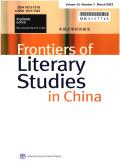古典主义2.0:当代中国在线古典主义诗歌的生命力
IF 0.1
4区 文学
0 ASIAN STUDIES
引用次数: 2
摘要
本文考察了中国当代诗人走向文学古典主义的各种途径。如果说“建制派诗歌”的特点是意识形态上的保守主义和审美上的民粹主义,那么与之相对的则是古典主义诗歌的网络场景,是对诗歌传统的创新延续。本文将从主题、语言和形式三个方面对这些创新进行探讨。主题创新还包括意识形态创新、世界观创新和都市化创新。特别是,我们认为当代网络古典主义诗人与其前现代前辈之间的主要区别在于他们的文化身份。与传统的文人(诗人、学者和官僚)不同,当代诗人经常在经济、知识或政治上被边缘化;或者至少,在被边缘化的古典主义诗歌中写作是一种不再容易转化为事业成功的技能。这种新型的诗歌身份,除了他们的现代教育之外,还产生了对我们生活世界的新解释,这是前现代诗歌所看不到的。尽管他们有着广泛的思想信仰和审美偏好,但大多数诗人都表现出大胆的实验精神,再加上古典诗歌传统中的全面多样性和精湛技艺,创作出了杰出的诗歌。几位著名古典诗人的原创作品,如曾绍礼、段小松、独孤十寿寿等,将被深入研究。古典主义2.0:当代中国在线古典主义诗歌的生命力本文章由计算机程序翻译,如有差异,请以英文原文为准。
Classicism 2.0: The Vitality of Classicist Poetry Online in Contemporary China
In this paper, we examine the various approaches toward literary classicism among contemporary Chinese poets. If “poetry of the establishment” features ideological conservatism and aesthetic populism, then its opposite is the online scene of classicist poetry which represents an innovative continuation of the poetic tradition. Here such innovations are discussed in terms of theme, language, and form. Thematic innovations include further that of ideology, worldview, and urbanity. In particular, we argue that a major distinction between contemporary online classicist poets and their premodern predecessors is in their cultural identity. Unlike a traditional literatus who is a poet, scholar, and bureaucrat, contemporary poets often endure economic, intellectual, or political marginalization; or at the very least, writing in the marginalized genre of classicist poetry is a skill that can no longer be readily translated into career success. This new type of poetic identity, in addition to their modern education, has given rise to fresh interpretations of our living world unseen in premodern poetry. Despite their broad spectrum of intellectual persuasions and aesthetic preferences, most of the poets have demonstrated an audacity to experiment, which, coupled with full versatility and virtuosity in the classical poetry tradition, creates outstanding poems. The highly original works of a few leading classicist poets like Lizilizilizi (Zeng Shaoli), Xutang (Duan Xiaosong), and Dugu Shiroushou (Zeng Zheng) will be examined in depth. Classicism 2.0: The Vitality of Classicist Poetry Online in Contemporary China 527
求助全文
通过发布文献求助,成功后即可免费获取论文全文。
去求助
来源期刊

Frontiers of Literary Studies in China
Multiple-
CiteScore
0.10
自引率
0.00%
发文量
360
期刊介绍:
Frontiers of Literature in China seeks to provide a forum for a broad blend of peer-reviewed academic papers of literature in order to promote communication and exchanges between litterateurs in China and abroad. It will reflect the enormous advances made in China in the field of literature in recent years. In addition, this journal also bears the mission of introducing the academic achievements on Chinese literature research to the world. The coverage will include the following main branches of literature, both theoretical and applied: ancient Chinese literature, modern Chinese literature and contemporary Chinese literature.
 求助内容:
求助内容: 应助结果提醒方式:
应助结果提醒方式:


